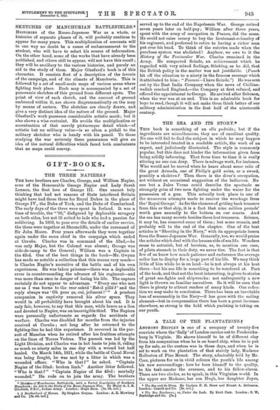GIFT-BOOKS.
THE THREE NAPIERS.f
THE hero brothers are Charles, George, and William Napier, sons of the Honourable George Napier and Lady Sarah Lennox, the first love of George III. One cannot help thinking that had not reasons of State interfered Britain might have had these three for Royal Dukes in the place of George IV., the Duke of York, and the Duke of Cumberland. The early days of the three were spent in Ireland. It was a time of trouble, the "'98," disfigured by deplorable savagery on both sides, but not ill suited to lads who had a passion for soldiering. In 1803, to pass over the details of earlier service, the three were together at Shonacliffe, under the command of Sir John Moore. Four years afterwards they were together again under the same chief in the campaign which ended at Coruna. Charles was in command of the 52m1,—he was only Major, but the Colonel was absent; George was aide-de-camp to the General; William was a Captain in the 43rd. One of the best things in the book—Mr. Gwynn has made so notable a collection that this means very much— is Charles Napier's narrative of the battle and of his own experiences. He was taken prisoner—there was a deplorable error in countermanding the advance of his regiment—and was more than once in danger of losing his life. The captors certainly do not appear to advantage. "Every one who met me as I was borne to the rear asked Est-il pine?' and the reply always was Oh pour fa, oui, joliment ! ' " A prudent companion in captivity removed his silver spurs. They would in all probability have brought about his end. It is only fair, however, to say that this man, while brave as a lion and devoted to Napier, was an incorrigible thief. The Napiers were personally unfortunate as regards the accidents of warfare. Charles was disabled for months from the injuries received at Corufia ; not long after he returned to the fighting-line he had this experience. It occurred in the pur- suit of Massena when he retired after his fruitless attempts on the lines of Torres Vedras. The pursuit was led by the Light Division, and Charles was in hot haste to join it, riding as much as ninety miles in one day with a wound but half healed. On March 14th, 1811, while the battle of Cazal Noval was being fought, he was met by a litter in which was a wounded officer. "Who is that P" he asked. "Captain Napier of the 52nd: broken limb." Another litter followed. "Who is that ? " "Captain Napier of the 43rd: mortally wounded." He rode on to join the army. The brothers • Sketeltos of Manchurian Battlefields, with a Verbal Description of Southern Manchuria : an Aid to the Study of the Russo-Japanese War. By Major A. L R. Glasfurcl, P.S.C., Indian Army. London : Hugh Rees. [8s. 6d. net.] t A Brotherhood of Heroes. By Stephen Gwynn. London: A, R. Mowbray and CO. [98. 6d. net] served up to the end of the Napoleonic War. George retired seven years later on half-pay; William after three years, spent with the army of occupation in France, did the same. He could not raise money to buy the lieutenant-colonelcy of his regiment, and preferred to retire to having a richer man put over his head. To think of the outcries made when the purchase system was abolished ! Anyhow, we owe to it the History of the Peninsular War. Charles remained in the Army. He conquered Scinde, an achievement which he regarded with very mixed feelings, thinking, as he did, that the British policy in the matter was not justifiable. (Punch hit off the situation to a nicety in the famous message which it attributed to him: " Peccavi—I have Scinde.") He was sent out by the East India Company when the news of Chillian- wallah reached England,—the Company at first refused, and offered the appointment to George. He arrived after Sobraon, when the war was at an end. This is an admirable book for boys to read, though it will not make them think better of our military administration in the first half of the nineteenth century.










































































 Previous page
Previous page